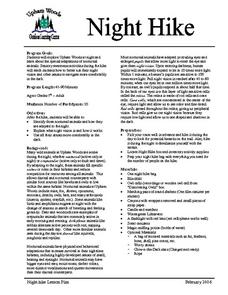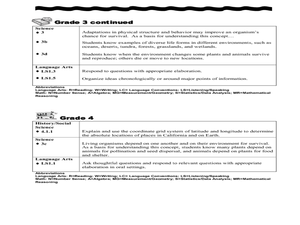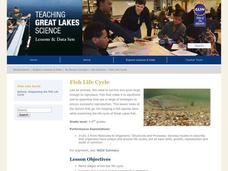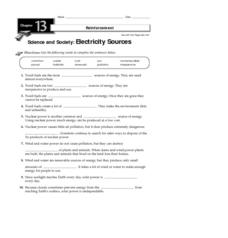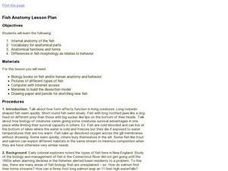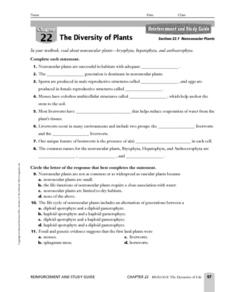Curated OER
African Savanna
First graders are introduced to the ecosystems of savannas throughout the world. Using new vocabulary, they identify and describe the characteristics of a savanna and the animals that live there. They also describe the Earth's physical...
Curated OER
Animal Adaptation
Students begin the lesson by observing animals in their natural habitat. Using the internet, they research the types of adaptations they have gone through to be able to live comfortably in their environment. They observe what they see on...
Curated OER
Night Hike
Students explore Upham Woods at night and investigate about the special adaptations of nocturnal animals. They identify three nocturnal animals and how they are adapted to the night. Students explain what night vision is and how it works.
Curated OER
Outdoor Activities/Problem Solving: Home Design
Young scholars create with sticks and stones. In this early childhood lesson plan, students use their problem-solving skills to make houses out of items they find outdoors.
Curated OER
Earth Pockets
Students identify the Earth's natural resources. In this Earth science lesson, students read the book The Great Kapok Tree and discuss types of natural resources. Students use categories such as wood, paper, and trees and list items that...
Curated OER
Home Design
Students investigate house structures by examining photographs. For this architecture lesson, students read the book Houses and Homes, analyzing the different structures and materials. Students utilize mud to create model...
Curated OER
It's not just pretty - it's a survival method!
First graders write explanations for why certain animals can only live in certain environments. In this animal survival lesson plan, 1st graders take pictures of animals and place them into the right environment after a lesson on the...
Curated OER
Urban Rivers
Students discuss how urban rivers have shaped the region in which they live. They research river geology and ecology. They examine a case study of life and living along the Delaware River.
Michigan Sea Grant
Fish Life Cycle
Fish are no different when it comes to a living being's primary objective—to reproduce. They do differ, including from fish species to fish species, in their life cycles, survival tactics and reproductive strategies. After discussion of...
Curated OER
Electricity Sources
In this electricity instructional activity, students review the different types of energy sources including fossil fuels, solar, wind, and nuclear energy. This instructional activity has 10 fill in the blank questions.
Curated OER
Now Take a Deep Breath
Young scholars research to answer questions related to deep sea diving. In this deep sea diving lesson, students answer questions on a worksheet using the Internet. They discuss pressure, gas laws, and the physiology of diving in the...
Curated OER
Build An Island
Students explore erosion. In this science lesson, students build an island and observe the effects of erosion on the island. Students discuss freshwater ecosystems in Hawaii.
Curated OER
Reef Fish Real Estate in the South Atlantic Bight
Young scholars research a species of reef fish to determine its habitat requirements as both a juvenile and an adult. They use this information to create a pamphlet in the style of a real estate brochure that describe the habitat and...
Curated OER
A Day in a Life of an Arctic/Antarctic Animal
Students, through video segments, explore what types of animals live in the Arctic and Antarctica. They also clear up any misconceptions they have about penguins or polar bears.
Curated OER
Creature Features
Students examine why certain animals live in only specific places throughout the world. Using animals, they classify them based on their characteristics and identify their basic needs. They also observe and compare the life cycles of...
Curated OER
Help! Someone Has Destroyed My Home!
Fifth graders use a mystery bag to discover ways in which humans endanger the life of animals by changing their habitat. In this animal habitat lesson, 5th graders work with a partner to design a solution to the problem of habitat...
Curated OER
Rock-a-bye Babies in a Wetland
Pupils review the way human babies grow and what type of care they need. Using the internet, they are introduced to five different wetland habitat animals and how their babies grow. They discover how they are born and what the mothers...
Curated OER
Pond Life Identification Kit
Learners explore ecology and biodiversty. They use the wet-mount procedure to make several slides to view using the microscope and draw what they see.
Curated OER
Fish Anatomy
Students identify and interpret the internal anatomy of the fish. They also identify and define vocabulary for anatomical parts and anatomical functions and forms. Finally, students identify and interpret the differences in fish...
Curated OER
Survey of the Plant Kingdom
In this plant kingdom worksheet, students will review the characteristics of the 12 divisions of the plant kingdom, comparing and contrasting their structures and life cycles. This worksheet has 17 matching, 5 short answer, and 5 fill in...
Curated OER
Nonvascular Plants
In this nonvascular plant learning exercise, students compare the characteristics of bryophyta, hepatophyta, and anthocerophyta. This learning exercise has 8 fill in the blank and 3 multiple choice questions.
Curated OER
Amazing Amphibians- Reading Comprehension
In this amazing amphibians worksheet, students read a one page essay about the characteristics of amphibians. They answer 10 true and false questions based on the reading.
Curated OER
Cloze Passage: Destruction of the Earth
In this destruction of the earth cloze procedure worksheet, students fill in the 12 missing words in the passage to help identify their reading level.
Curated OER
Camouflage, Protection, & Adaptations—Who am I?
Students explore ocean animal adaptations. For this animal adaptations lesson, students examine how different ocean animals use adaptations other than camouflage to protect themselves.
Other popular searches
- Animals Water Habitats
- Animal Water Habitats
- Land or Water Habitats
- Shallow Water Habitats
- Water Habitats Lesson Plans
- Describe Water Habitats
- Water Habitats Rivers




